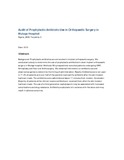| dc.contributor.author | Kigera, JWM | |
| dc.contributor.author | Turyakira, C | |
| dc.date.accessioned | 2013-07-11T06:45:54Z | |
| dc.date.issued | 2012 | |
| dc.identifier.citation | h e ANNALS of AFRICAN SURGERY • Volume 9 • January 2012 | en |
| dc.identifier.uri | http://profiles.uonbi.ac.ke/jameskigera/publications/audit-prophylactic-antibiotic-use-orthopaedic-surgery-mulago-hospital | |
| dc.identifier.uri | http://erepository.uonbi.ac.ke:8080/xmlui/handle/123456789/47273 | |
| dc.description.abstract | Background: Prophylactic antibiotics are entrenched in implant
orthopaedic surgery. We conducted a study to determine the use
of prophylactic antibiotics in clean implant orthopaedic surgery in
Mulago hospital.
Methods: We prospectively recruited patients undergoing ORIF,
Athroplasty and Foot and Ankle surgery. We obtained information
on antibiotic use and observed surgeries to determine the timing of
administration.
Results: Antibiotics were not used in 17.3% of patients and over half
of the patients received the antibiotic after the skin incision had been
made. The antibiotics were administered about 11 minutes from
incision.
Conclusion: Majority of patients either did not receive antibiotics
or received them after the skin incision had been made. The use of
a third generation cephalosporin may be associated with increased
complications and drug resistance. Antibiotic prophylaxis is in variance
with literature and may result in adverse outcomes. | en |
| dc.language.iso | en | en |
| dc.title | Audit of Prophylactic Antibiotic Use in Orthopaedic Surgery in Mulago Hospital | en |
| dc.type | Article | en |
| local.publisher | College of Health Sciences, University of Nairobi | en |

